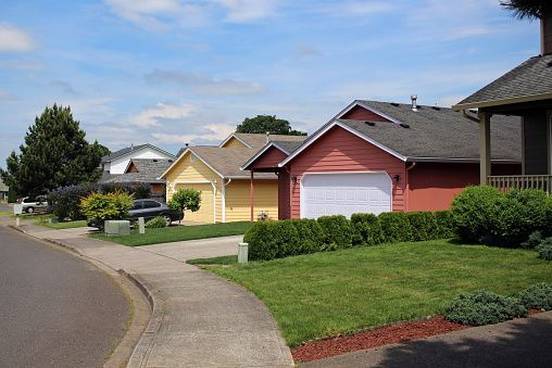
Ucalegon
Definition - “A next-door neighbor, or a neighbor whose house is on fire” (Merriam-Webster’s Second New International Dictionary, 1934)
Ucalegon, in Trojan legend, was one of the counselors who sat with Priam, the king of Troy. His house, said to be situated next to Aeneas’, was set aflame when the city of Troy was taken by the Greeks.
Your home, my home, your neighbors home; they all have the potential to be engulfed in flames just fifteen minutes after a fire starts. The good news is that a grand total of one or two sprinklers usually controls a residential fire. If enough common sense prevails, the ucalegons of the future will have security through automatic protection.
— Mark Brennan, Common questions regarding residential fire sprinklers (in PM Engineer), Aug. 2000

Aemulatio vicini
Definition - the exercise of a legal right only to cause annoyance, harm, or injury to another
Playing a stereo loudly at 8 AM on Sunday morning; tap dancing in sabots; giving your child a drum set. All of these things might well be said to fall in the category of aemulatio vicini, the legal term that perhaps comes closest to saying ‘just because you can do something doesn’t mean that you should do it.’ Aemulatio vicini comes from Latin, in which it means “malevolence or jealousy of a neighbor.”
A proprietor cannot intercept percolating water and hence cut off supply to the inferior heritor for purely spiteful reasons. This is because in Scotland the right to drain away the water is subject to the doctrine of aemulatio vicini under the law of nuisance.
— Bryan Clark, Water Use Reform in Scotland: A Critical Analysis (in Journal of Environmental Law), 2006

Morrowing
Definition - an exchange of aid among farmers
Morrowing is thought to be an alteration of marrowing, itself the gerund of a dialect sense of marrow (not the sense meaning ‘the stuff inside your bones’), which in Northern Ireland has the meaning “to exchange aid with a neighbor.”
In Tyrone, a poor farmer who has but one horse will get a neighbour to lend him his horse to plough or harrow; and then, on the next day, he will lend his in return. This they call “morrowing.”
— Notes and Queries, 24 Jun. 1876

Combite
Definition - an informal cooperative group of Haitians helping a neighbor get work done to the accompaniment of drumming and singing
The combite has some semantic overlap with barn raising and one sense of the word bee (“a gathering of people for a specific purpose, such as a quilting bee”), but has more singing and dancing. What’s not to love?
”Combite” (in Creole, kôbit), as the word is used in Marbial, is actually a generic term for a number of different arrangements, all of which have in common the fact that a group of people are engaged in working simultaneously at one task for part of the whole of one day.
— Rhoda Metrauz, Affiliations Through Work in Marbial, Haiti (in Primitive Man), 1 Jan. 1952

Spite fence
Definition - an unsightly fence or wall that serves no useful purpose, is so constructed as to be an injury to adjoining property, and is erected and maintained maliciously for the purpose of injuring a neighbor (as by obstructing unreasonably his air, light, or view)
It seems safe to assume that we have had spite fences for a very long time; they probably date back to just after we first started making fences. Our records of use, however, show that the term has only been in use since the middle of the 19th century.
The proprietors of Grace Church have erected a ‘spite fence’ against one of their neighbor’s houses, at an expense of over $2000, because the windows of that neighbor’s house overlook Rev. Dr. Taylor’s flower garden! Great business for a church. ‘Oh, Grace-ious!’
— The Liberator (Boston, MA), 1 Oct. 1852

Neighborly
Definition - of, relating to, or characteristic of congenial neighbors
Neighbor has been with us for a very long time (since before the 12th century); the adjective and adverb neighborly came about several hundred years later, in the 16th century. It is somewhat odd that the word has always seemed to carry the meaning of congeniality and friendliness, when one considers how infrequently these words apply to most neighbors, but perhaps this is just another one of the many ways in which the English language doesn’t make sense.
Let vs doe all we can therfore, & pray the lord to further our worke, the rulers with the sword defend the good & punish the evil, the preachers with the word, the scholemasters by their teaching the fathers by bringing vp their children, the maisters by correction of their servants, the peple in obeying their heads, & neighborly love.
— James Pilkington, Aggeus and Abdias, 1562
The quality or state of being neighborly is neighborliness, the state of not having any neighbors is neighborless, and the word for “the relationship and activity of a neighbor" is neighborship.

Neighborstained
Definition - “Stained with the blood of neighbors” (Merriam-Webster’s Second New International Dictionary, 1934)
Neighborstained is, we regret to inform you, no longer entered in our dictionary. It had previously been entered largely because William Shakespeare has used it, and we (and most other dictionaries) tended to include all the words used by the Bard, whether they were in mainstream use or not. We are bringing it back solely so that you may have the proper words to describe how we all feel about our neighbors on occasion.
Rebellious Subiects, Enemies to peace,
Prophaners of this Neighbor-stained Steele,
Will they not heare? What hoe, you Men, you Beasts,
That quench the fire of your pernitious Rage,
With purple Fountaines issuing from your Veines.
— William Shakespeare, Romeo and Juliet, 1623





